
Measles cases have been rising in the UK and around the world, with 529 reported cases in England in 2025, with 68% occurring in children under 10!
The increase is being blamed on the poor uptake of the MMR vaccine.
What is measles and what are the symptoms?
Measles is a highly contagious disease which is spread by coughs and sneezes.
Common symptoms include:
- high fever
- sore, red and watery eyes
- coughing
- sneezing
Small white spots may appear inside the mouth.
A blotchy red or brown rash usually appears after a few days, typically on the face and behind the ears, before spreading.
The rash can be harder to see on brown and black skin.
Why are measles cases rising?
The number of young primary school children in the UK who have had both recommended doses of the MMR vaccine is below the World Health Organisations targets.
NHS figures for 2023-2024 show that 84.5% of children across the UK had received two MMR doses by their fifth birthday. The recommended figure is 95%.
Across England, London had the lowest take-up at 73.3%, followed by the West Midlands at 83.1% and the North West at 84.5%.
What the MMR vaccine is for
The MMR vaccine protects against:
- measles
- mumps
- rubella (german measles)
These 3 infections spread easily between people and can lead to serious problems including meningitis, blindness and hearing loss.
If you're pregnant, getting measles can cause premature birth, miscarriage or still birth. And getting rubella can cause serious problems for your baby such as damage to their sight and hearing.
2 doses of the MMR vaccine gives you long-term protection.
Getting vaccinated also helps protect people who cannot be vaccinated, such as unborn babies, newborn babies and anyone with a weakened immune system.
Who should have the MMR vaccine
The MMR vaccine is recommended for all babies and young children, but older children and adults can have it if they were not vaccinated when they were younger.
Babies and young children
Babies and young children are given 2 doses of the MMR vaccine as part of the NHS vaccination schedule.
They're given a dose at:
- 1 year old
- 3 years 4 months old
Babies between 6 and 12 months can have an extra dose of the MMR vaccine before this if they need it to protect them if:
- they're travelling abroad to an area with a lot of measles
- they've been close to someone with measles
- there's an outbreak of measles
Older children and adults
The MMR vaccine can be given at any age.
Speak to a GP about getting vaccinated if you did not have it as a child, you only had 1 dose or you're not sure if you've been fully vaccinated.
It's especially important to make sure you're vaccinated if:
- you're a child, teenager or young adult
- you could become pregnant
- you're travelling to, or living in, a country where there is a higher risk of getting measles, mumps or rubella
- you're a healthcare worker
- you were born between 1970 and 1990 (as you may not have been vaccinated against all 3 infections)
Your GP surgery should be able to tell you which vaccinations you've already had.
If you were born before 1970 and have not had measles, mumps or rubella (german measles) or their vaccines, you can ask your GP surgery for the MMR vaccine.
Who cannot have the MMR vaccine
Most people who need the MMR vaccine can have it.
But because it's a live vaccine, which means it contains a weakened version of measles, mumps and rubella, it's not suitable for everyone.
The MMR vaccine is not given if:
- you're pregnant
- you have a weakened immune system, either because of a health condition or because you are taking medicines that suppress the immune system
- you've had a serious allergic reaction (anaphylaxis) to any ingredients in the vaccine, including gelatine or neomycin
For more information visit www.nhs.uk/vaccinations/mmr-vaccine


